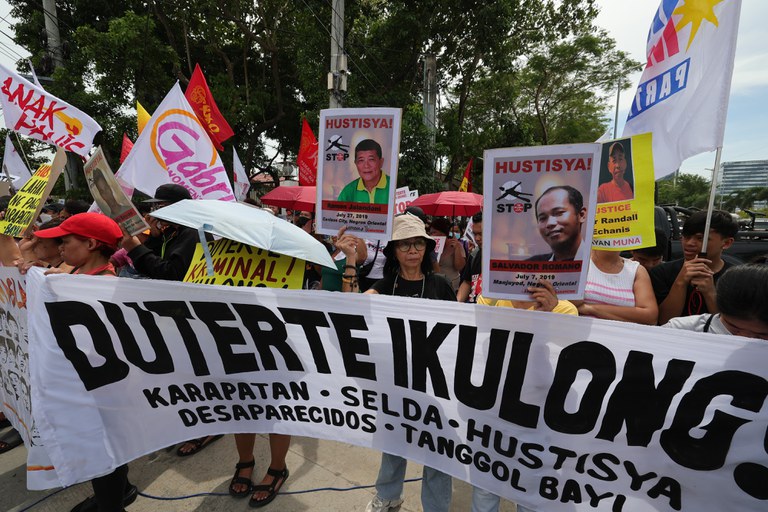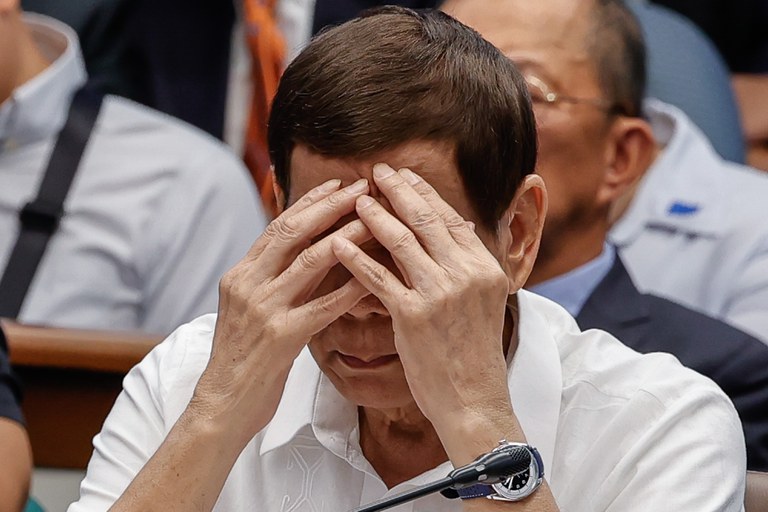Rodrigo Duterte on drug war: ‘I did what I had to do’
2024.10.28
Manila
 Former President Rodrigo Duterte takes the oath as he appears before a Philippine Senate hearing in Manila, Oct. 28, 2024.
Former President Rodrigo Duterte takes the oath as he appears before a Philippine Senate hearing in Manila, Oct. 28, 2024.
In his first public testimony as a private citizen, former Philippine President Rodrigo Duterte defiantly defended his administration’s war on drugs, saying he alone bore responsibility for it.
While testifying at a Philippine Senate hearing, the 79-year-old ex-leader said “I did what I had to do” in the crackdown where thousands of Filipinos were killed during his presidency (2016-22).
He also admitted to running his own anti-narcotics “death squad” when he previously served as mayor of southern Davao city.
“Do not question my policies, because I offer no apologies, no excuses,” Duterte told the senators investigating his drug war during the hearing on Monday.
Wearing a white shirt and appearing frail, Duterte faced off with his accusers, who included relatives of those slain in his drug war and Leila de Lima, a former senator his administration had jailed on drug-peddling charges.
Duterte said that everything he did during his time in office was covered by his presidential mandate.
“I did what I had to do. And whether you believe it or not, I did it for my country. The war on illegal drugs is not about killing people, it is about protecting the innocent and the defenseless.”
Often cursing and talking over other speakers, Duterte reiterated that his lethal policy towards criminals was one of “no quarters given, no quarters asked,” adding he had often urged police officers to shoot criminals to “overcome the resistance.”
“I have tried to do the best I can to address the problem of illegal drugs firmly and without compromise,” the former president said. “For all its successes and its shortcomings, I, and I alone, take full legal responsibility for everything that they have done pursuant to my orders.”
“If you think you will be killed, shoot him in the head. That would be one less criminal,” Duterte said, arguing that such an action was one way to “repel the aggression.”

Upon intense questioning by opposition Sen. Risa Hontiveros, Duterte admitted the existence of his own private death squad, which carried out extrajudicial killings when he was the long-time mayor of Davao.
“I can make the confession now if you want. I’m really doing it, but don’t involve the police,” Duterte told the hearing. “I have a death squad, seven men, but they’re not police. They’re gangsters.” He refused to name them.
Still, Hontiveros said the admission, made at an official Senate inquiry, was a “bombshell” that should be worth pursuing.
The Philippine government said about 8,000 suspected dealers and addicts had been killed during the anti-drug campaign of the Duterte administration. Human rights activists have said the toll could be much higher.
RELATED STORIES
In testimony, senior Philippine police officer calls national force ‘biggest crime group’
Philippine court clears arch Duterte critic de Lima in final narcotics case
Philippine court convicts 4 police officers for killings in Duterte drug war
Philippines will not block ICC interviews in probe into Duterte’s drug war
Aside from the Senate, the House of Representatives has also been investigating the previous administration’s drug war.
Eight police officers have so far been prosecuted for killings in Duterte’s drug war, and in none of those cases did the former president’s lawyers offer any help.
The killings under the Duterte administration are currently the focus of an International Criminal Court (ICC) investigation for alleged state-sanctioned “crimes against humanity.”
Carlos Conde, senior researcher for Human Rights Watch in the Philippines, said it was expected that Duterte would double down on his tough policy in the Senate probe.
The hearing was attended by the former leader’s senator-allies. These included Christopher Go, Duterte’s former personal aide, and former national police chief Ronald dela Rosa, the chief implementor of Duterte’s drug war.
“I expect his backers to exploit that to the hilt,” Conde told BenarNews. “I also expect his camp to argue, self-servingly, that since both houses of Congress are investigating the drug war killings, the ICC has no business to investigate anymore.”

Under Duterte’s orders, Manila withdrew from the ICC in 2019 as the court sought to investigate alleged human rights abuses committed under the drug war.
Duterte’s successor, President Ferdinand Marcos Jr., had previously said the Philippines did not need outside investigators because the country’s justice system worked. However, Solicitor General Menardo Guevarra said in July that the Marcos administration would not block the ICC from interviewing people allegedly involved in Duterte’s deadly drug war.
The Marcoses and Dutertes, two of the country’s top political dynasties, used to be allies in the 2016 elections. But hostilities between the two families began as the former leader grew wary that his successor would hand him over to the ICC, analysts said.
‘Justice must now be served’
Perci Cendaña, a congressman, called for the justice department to begin criminal proceedings against Duterte.
“The admission lays bare his direct role in orchestrating state-sponsored killings,” Cendaña said, noting that Duterte should face the courts for his admission.
“The lives of countless Filipinos were sacrificed on the altar of Duterte’s ruthless anti-drug campaign. Justice must now be served without delay.”







